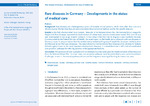Rare diseases in Germany - Developments in the status of medical care
Schlangen, Miriam
Heuing, Katharina
Background: Rare diseases are a heterogeneous group of complex clinical patterns, which more often than not run a chronic course. The fact that they are rare complicates the provision of medical care for the specific diseases.
Results: In the field of action titled ‘Care, Centres, Networks’ of its National Action Plan, the National Action League for People with Rare Diseases recommends the formation of a three-level, interconnected centre model. This form of care was investigated in two large research projects. It was shown that the time to diagnosis was markedly reduced. Commissioned by the Federal Ministry of Health, the expert report on the health status of people with rare diseases in Germany issued in 2023 concludes that the medical care provided to this group of people has improved markedly since the National Action Plan was introduced. The establishment of the Centres for Rare Diseases (ZSE, Zentren für Seltene Erkrankungen) is seen as the most important development. However, it is noted that there is still a lack of coordinated care provision pathways for referring patients to the appropriate facilities.
Conclusion: The provision of care to people with rare diseases has improved upon the implementation of the measures from the National Action Plan. In a next step, care provision pathways must be established across sector boundaries. Challenges remain in the area of psychosocial care and the long-term securing of funding for these structures.
Dateien zu dieser Publikation

